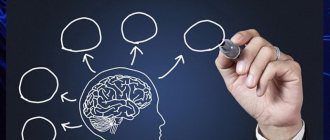What is differential psychology? Let us consider in this article and expand on this concept in detail.
“No two people are born exactly the same; each of them is distinguished from the others by its natural gifts, some of which are naturally suited to one occupation, and others to another.”
Plato
While general psychology is responsible for conducting comprehensive studies of the general characteristics of people, differential psychology deals with opposing factors. This means that the subject of study is the differences in the behavior of people from each other. His research led to important discoveries and brought to light the enormous interest that differences in people can generate.
For example, in general psychology, group therapies are usually conducted in which participants undergo various procedures. Differences that arise between group members during therapy are considered errors and are not investigated. On the other hand, for differential psychology these data are very relevant and deserve study.
The best way to understand the basics on which this type of psychology is based is to refer to an easy to understand example. In general psychology there is a tendency to have therapies that work with different groups who undergo specific procedures. There is always a main group and a control group, the results of the study are analyzed later. Differences that arise between people over the course of therapy are considered errors and are not studied, but with the help of differential psychology this data is actually a fascinating aspect worth studying.
This is why it is so important to study people independently, analyzing the differences that arise between different people in terms of personality and intelligence. To properly apply differential psychology, experts take as a basis the paradigm introduced by Thurston in 1923 and based on the relationship between the organism, stimulus and response.
So, differential psychology is a branch of psychology that studies the differences between the behavior, thoughts, feelings and behavior of people, as well as the processes that lead to the existence of these differences.
To understand how people are similar and what psychological characteristics differ from each other, differential psychology often uses the scientific method and finds patterns that may exist in the differences between people.
History of industry development
Before studying this section of psychological science, it is advisable to find out who coined the term differential psychology. This concept was first coined by psychologist William Stern (1871–1938). In 1900, the scientist published a book called “On the Psychology of Individual Differences: Ideas for Differential Psychology.”
Francis Galton, who was a relative of Charles Darwin, made a huge contribution to the development of science. After him, his student Karl Pearson contributed to the development of the direction. He made significant contributions to the field of statistics.
Between 1960 and 1970, behaviorism emerged and influenced the decomposition of differential psychology. Two authors, John Fuller and Bob Thompson, published a paper entitled "Behavioral Genetics." In it they described discoveries in the field of genetics. Thus, the authors explained polygenic transmission and mutations.
Books
This is a brief description of differential psychology as a science. Since the topic is quite complex and voluminous, reading one article will clearly not be enough. Here is a list of books with which you can study it in more detail.
- “Differential Psychology” Sofya Nartova-Bochaver.
- “Differential psychology. Individual and group differences in behavior" Anna Anastasi.
- “Differential psychology and psychodiagnostics” Konstantin Gurevich.
- “Differential psychology: a textbook” Valery Mashkov.
- “Differential Psychology” Alexander Libin.
- “Differential psychology and its methodological foundations” William Stern.
- Neurotic Styles by David Shapiro.
We recommend starting with the book by the founder of differential psychology, William Stern, which is still relevant today.
We wish you good luck!
Did you like the article? Join our communities on social networks or our Telegram channel and don’t miss the release of new useful materials: TelegramVKontakteFacebook
We also recommend reading:
- Storytelling
- Psychosemantics
- Psycholinguistics as a tool for in-depth study of speech and language
- Cognitive psychology and cognitive psychotherapy
- Psychodiagnostic methods
- Wundt's method of studying psychology
- Criminal psychology
- Practical psychology
- Scientific knowledge: basics
- Situationism in psychology and human behavior
- Cattell's personality model
Key words: 1 Communications, 4 Psychoregulation
What tasks do followers of the direction face?
Any direction of psychological science poses a number of tasks on which various studies are conducted. The goals of differential psychology include:
- Analysis of group distribution of characteristics.
- The study of character traits and their manifestations.
- Development of a theoretical basis for psychodiagnostics.
- Highlighting individual differences.
- Explaining behavior changes.
- Determining differences between people and the reasons for their occurrence.
The results obtained after conducting research help criminologists, judges, teachers, and managers when recruiting personnel.
Research methods
There are several methods used by specialists involved in the development of differential psychology.
Standard Methods
General scientific methods are divided into two large groups:
- Observation is a method of description, the essence of which is to observe and record the behavior of the subject.
- An experiment is an experience that is carried out to obtain scientific knowledge. In this case, inspectors interfere in the life of the observed object.
The first method has a number of strengths and weaknesses. Advantages:
- Perception of a person as a whole person.
- Shows the context of an individual's life.
- Observation helps to collect many facts about the natural behavior of an individual.
Flaws:
- The inability to separate incidental phenomena from their accompanying facts.
- The results are recorded manually as a description of what was seen.
- It is not possible to repeat an identical observation to verify the selected points.
The experiment has one significant advantage - it can be carried out as many times as necessary, resolving controversial issues, but it is impossible to see a holistic picture of the individual.
Modeling can be considered a separate method. Its principle is that specialists try in every possible way to recreate the real situation in order to conduct an experiment. The result depends on how accurately the situation is reproduced.
Psychogenetic tests
Experts distinguish two large groups of psychogenic research methods:
- Twins - twins can be dizygotic or monozygotic. Psychologists study representatives of twin pairs to find out what differences appear between them under the influence of genetics and environmental factors.
- Genealogical - methods of studying individual families according to their pedigrees. To study, researchers need to create an accurate family tree.
Studying historical data
Such methods are used to study the lives of prominent personalities or ordinary people. Three research methods are used:
- Diary - the researcher studies an individual personality, describes the stages of development, and the behavior of the subject.
- Autobiographical - studying people using audio and video materials.
- Biographical is a method in which the biography of famous people is studied.
Psychological research
This includes two popular methods:
- Self-esteem - the patient independently explains his mental characteristics, try to describe his behavior. Not every subject can tell about themselves in detail. Many people hide certain aspects because of shyness.
- Self-observation - the individual independently observes his behavior and draws conclusions about its changes.
There is no ideal method to study each person individually. The psychologist needs to combine them depending on the situation and personality traits.
Lecture notes “Individual characteristics in activity and communication”
Lecture
Individual characteristics in activity and communication
| Content: | 1. Individual characteristics of a person 2. Individual. Individuality. Personality 3. Factors influencing the mental development of the individual 4. Temperament as the biological basis of personality 5. Materials for self-study on the topic 6. Homework |
1. Individual characteristics of a person
The purpose of business interactions is to solve a specific problem (educational, scientific, industrial, commercial, etc.) facing the organization. Therefore, business communication is strictly regulated - employees of the organization must adhere to certain standards of behavior. And although the exchange of information in business communication is not personal in nature, but is primarily due to the need to jointly solve a work problem, the nature of business communication is still significantly influenced by the individual personal characteristics of employees.
Look at the pictures below. How would you respond in similar situations?
| Rice. 1 | Rice. 2 |
| Rice. 3 | Rice. 4 |
All people are different. Their emotions, thinking, behavior are influenced by many factors, such as age, gender, level of education, belonging to a particular profession, intelligence, temperament, volitional qualities, etc. In other words, all people have certain differences. All these differences can be individual, group or typological.
Rice. 5a. Human differences
Individual differences are manifested in temperament, character, will, motivation, intelligence, operating style, use of defense mechanisms, ways of overcoming difficulties, etc.
Group differences are established and manifested in the following criteria:
§ floor;
§ age;
§ ethnicity;
§ nature of professional activity;
§ class affiliation, etc.
Rice. 5 B. Human differences
Typological differences are based on assigning a person to one type or another. Typological differences imply that people can be divided into groups according to different psychological characteristics. For example, into extroverts and introverts, into people with an analytical or synthetic style of perception, into sociable and withdrawn, and so on.
Typological differences are the largest category of differences in psychology, since there are a large number of psychological characteristics by which people can be divided into groups.
Individual differences can be intra-individual and inter-individual.
Intra-individual differences include:
§ the difference between a person and himself at different periods of life;
§ the difference between a person and himself in different situations (in different social groups);
§ the ratio of various qualities in an individual (for example, the ratio of verbal and non-verbal intelligence, the ratio of volitional and emotional properties).
Interindividual differences include:
§ the difference between an individual person and most others (correlation with the general psychological norm);
§ the difference between a person and a specific group of people (student group, professional community, etc.)
Rice. 6. Individual differences in humans
2. Individual, individuality, personality
Individual psychological characteristics of a person determine the uniqueness of each person, and therefore his behavior and manner of communication. Differential psychology studies individual characteristics and human behavior.
| Differential psychology is a branch of psychological science that studies differences between individuals and groups of people in psychological characteristics, as well as the range, nature, causes of these differences and their impact on various areas of people's lives. Differential psychology is aimed at studying psychological differences among representatives of different social, age and class groups. This method differs significantly from others, where they usually search for common characteristics. |
Differential psychology not only identifies and describes individual differences in people, but explains their origin and development. Why, for example, do some strive to be leaders, while others feel more comfortable in the role of performers; why one person is burdened by noisy companies, while for another, loneliness seems unbearable.
Let us consider the basic concepts of differential psychology, which we will need to understand the essence of the individual psychological characteristics of the individual: individual, individuality, personality.
An individual is a person as a representative of the genus Homo Sapiens, a single natural being. Individual properties include gender, age, type of nervous system, race, interhemispheric asymmetry, etc.
| An individual (Latin individuum “indivisible”) is a separate organism, with its inherent autonomy; man as a single representative of the human race. The individual is what “man in general” is. |
Even though people have the same brain structure, their nervous systems can function differently, so no two people are exactly alike. They are distinguished by individual psychological characteristics. These characteristics can be expressed in the speed of work, the ability to control one’s emotions, sociability or isolation, the degree of anxiety, etc.
Individuality is a feature of an individual person, his uniqueness, a set of his unique qualities, a set of psychological and social qualities (both innate and acquired) that distinguish him from others. This is uniqueness, originality, inherent in both biological and social essence.
Individuality is manifested in traits of temperament, character, habits, prevailing interests, in the qualities of cognitive processes (perception, memory, thinking, imagination), in abilities, individual style of activity, etc.
| Individuality (from the Latin individuum - indivisible, individual) is a set of characteristic features and properties that distinguish one individual from another; the uniqueness of the individual’s psyche and personality; originality, uniqueness of spiritual, physiological and personal qualities. Individuality means the totality of physical and mental characteristics inherited and developed in the process of ontogenesis that distinguish a given individual from all others. |
Personality is a stable system of socially significant traits that characterizes an individual as a member of a particular society. Personality reveals itself in a person’s conscious activity and can manifest itself in a tendency to defend one’s point of view and take initiative; This is educational and cognitive motivation, perseverance in achieving a goal, the desire for perfection, a critical attitude towards one’s actions, nobility of thoughts, a compassionate attitude towards those in need, a person’s political views, etc.
| Personality is a concept developed to reflect the social nature of a person, consider him as a subject of sociocultural life, define him as a bearer of an individual principle, self-revealing in the context of social relations. Personality in psychology refers to a systemic (social) quality acquired by an individual in objective activity and communication and characterizing the degree of representation of social relations in the individual. |
The personality of each person is endowed only with its own inherent combination of psychological traits and characteristics that form its individuality. Personality is formed only in society. One is not born a person, one becomes a person. And this formation occurs under the influence of many factors.
When we talk about individual personality characteristics, we mean the totality of individual, individual and personality differences. That is, biological (innate, given to us by nature), psychological (acquired by us during individual development) and social (social norms and rules learned by us in the process of interaction with society).
Let's consider what factors influence a person's mental development.
3. Factors influencing human mental development
3.1. Traditional ideas about factors influencing development
Individual characteristics of a person
Rice. 7a. Factors influencing the development of the human psyche
If you look at information on the Internet or textbooks on general psychology, you will see there the following classification of factors in the development of individual human characteristics.
Modern textbooks say that there are three factors in human development: heredity, upbringing and environment.
These three factors are combined into two large groups:
§ biological (endogenous, internal);
§ social (exogenous, external).
Biological factors include heredity, social factors include upbringing and environment.
3.2. Biological factors of human development
Let's see what belongs to the hereditary biological factors of human development:
§ anatomical and physiological structure of man as a biological species (body structure, structure of internal organs, features of their functioning, etc.);
§ unconditioned reflexes (sucking, salivation, defensive, indicative, etc.);
§ physical characteristics (physique features, facial features, hair color, skin color, eye color, etc.);
§ functional features (blood type, metabolism, etc.);
§ anomalies of hereditary origin (color blindness, hemophilia, mental illness, etc.);
§ features of the nervous system (the strength of the processes of excitation and inhibition, their balance and mobility);
§ makings.
However, physiologists argue that the biological factors in the formation of individual characteristics include not only heredity, but also innateness.
Congenitality is characteristics acquired by a child during intrauterine development. Thus, the diseases suffered by the mother during pregnancy, her taking certain medications, heavy physical activity, strong emotional experiences, etc. are of great importance for the formation and development of the fetus.
Biological factors (both hereditary and congenital) constitute only the possibility, the prerequisites for the future development of the individual.
In modern psychology, there has been debate for many years about how strongly biological factors influence personality development.
It is believed that a favorable environment and appropriate upbringing can neutralize, nullify or significantly weaken the influence of unfavorable biological factors on the harmonious development of the individual. For example, the development of abilities depends not only on inclinations. Abilities develop through activity; a person’s own activity is important.
Individual characteristics of a person
Rice. 7b. Factors influencing the development of the human psyche
Representatives of the opposite point of view believe that man is a biological being, therefore he is by nature endowed with certain character traits and forms of behavior. Representatives of this theory argue that heredity determines the entire course of human development. This theory is called biologization theory.
This point of view was actively criticized in the Soviet Union; modern psychology textbooks also often contain negative reviews of this theory. However, the practice of recent years shows that the biological component in human development plays a much larger role than orthodox psychological schools assign it.
This is partly confirmed by the active introduction into the practice of modern psychologists of body-oriented practices, movement therapy, and meditation (the electrical activity of the brain changes). Psychologists-educators and defectologists are increasingly using in their work techniques related to the development of fine motor skills, general motor skills, and external stimulation of brain activity. Neuropsychology, psychophysiology, and neuropsychophysiology have become very popular recently.
In this regard, the importance of biological factors cannot be underestimated.
3.2. Social factors of human development
No matter how much we would like to think that a person is free to do as he wants, in fact, all our actions, words and even thoughts are subject to the invisible influence of social factors. They are the ones who shape a person’s personality, dictate how to act in a given situation and what is “good” and what is “bad”.
Social factors can be divided into three main groups:
§ macrofactors – factors that influence every inhabitant of the planet, state or interstate entities;
§ mesofactors - factors influencing a group of people who are united by a common worldview due to belonging to the same ethnic group, living in the same city or region, receiving information from the same source (socio-economic factors);
§ microfactors - factors that influence a narrow group of people who are in direct contact with each other.
But it should be remembered that a person is not formed passively under the influence of the environment. In fact, the most important factor in development is the activity of the child himself. Activity is a form of human interaction with the outside world. The manifestation of activity is always individual and multi-level.
There are three types (levels) of human activity in his interaction with the environment :
§ biological activity –
a child
is born with certain natural needs (organic, in movement, etc.);
these needs ensure the child’s connection with the outside world, so by crying the child communicates the desire to eat, etc.; § mental activity - this activity is associated with the formation of mental processes through which knowledge of the world occurs, which is necessary for mastering theoretical knowledge, practical skills, work skills, etc.;
§ social activity is the highest level of activity when a person changes the world around him and himself.
Certain elements of the environment at different times have different effects on a person depending on the degree and nature of his activity in relation to these elements. All factors of activity (biological, psychological, social) dough are interconnected. Absolutization of the role of any of them in the formation of personality is impossible.
The social environment cannot fundamentally influence the development of personality traits. It is well known that the same social conditions of life lead to different levels of moral, intellectual and spiritual development.
The degree of influence of social factors will be determined by the capabilities and aspirations of the individual himself in their implementation. The whole point is that the natural beginning of a person is always individual: the peculiarities of the course of mental processes, the makings of abilities, the degree of activity, etc. Therefore, people themselves have different attitudes towards the knowledge of art, literature, and the development of knowledge as technical or humanitarian. Some people are passionate about sports, while others are contraindicated for health reasons. Naturally, their emerging qualities will be different.
Thus, even the combined action of these factors does not always ensure the formation of those necessary personality qualities, the purposeful education of which is carried out by certain social institutions.
We cannot guarantee that a person will develop a love of work, for example, or compassion for homeless pets. We cannot equally develop a love of art in everyone, instill feelings of high patriotism, respect for elders, etc.
The reason for this, as we said earlier, is that a person does not simply absorb new information communicated to him, but passes it through his genetic reserve of knowledge, which is expressed in the specific structure of the body, the characteristics of the brain, and the corresponding inclinations.
Thus, our scheme takes the following form.
Individual characteristics of a person
Rice. 7th century Factors influencing the development of the human psyche
3.3. Psychological factors of human development
For a long time, in traditional psychology in the socialization of the individual, the emphasis was placed on comparing the roles of biological and social factors, on how their mutual influence affected the development of the individual.
However, in clinical psychology, neuropsychology and psychiatry, scientists increasingly began to identify a specific development factor associated with a person’s mental activity - with his emotions, abilities, thinking, memory, imagination, etc.
Individual characteristics of a person
Rice. 17 Factors influencing the development of the human psyche
Despite the fact that these mental characteristics of a person were not considered as specific factors influencing the development of personality, many scientists considered them as components of the personality structure.
The question of personality structure is quite complex and controversial; many authors have tried to describe the mental component of personality structure, however, at the moment there is still no consensus on this issue in psychology.
Sigmund Freud, Carl Gustav Jung, Alfred Adler, Eric Berne presented their vision of personality structure at one time.
The theories have become widespread among domestic authors
— Rubinshtein Sergei Leonidovich,
— Platonov Konstantin Konstantinovich,
— Kovalev Alexander Grigorievich,
— Petrovsky Artur Vladimirovich,
— Ananyev Boris Gerasimovich.
Other theories of personality structure are also known.
We will do it easier for you. Since there are three mental phenomena (mental processes, mental states and mental properties), we, based on this, will describe the psychological factors of development (which, in fact, are the mental structure of the individual).
So, psychological factors influencing personality development:
§ mental processes are rapidly occurring mental phenomena, such as: sensation, perception, memory, imagination, thinking;
§ mental states are longer-term mental phenomena, such as: vigor, fatigue, mood, concentration, etc.;
§ mental properties or qualities - stable permanent mental characteristics of a person, mainly hereditary or congenital, such as: temperament, character, abilities, volitional qualities, inclinations, etc.
4. Temperament as the biological foundation of personality
The psyche of each person is unique. Its uniqueness is associated both with the peculiarities of the biological and physiological structure and development of the organism (internal conditions), and with the unique composition of social connections and contacts (external influences).
Biologically determined substructures of personality include temperament, as well as gender and age characteristics of the psyche. Thus, personality acts as a set of internal conditions through which external influences are refracted.
The most important component of internal conditions is the properties of the nervous system. The type of nervous system in turn determines a person’s temperament. But not in all its manifestations, temperament depends only on the hereditary properties of the nervous system. The social environment has a significant impact on both the rate of development of temperament and the ways in which a person expresses it.
Temperament is a set of properties that characterize the dynamic features of the course of mental processes and human behavior, their strength, speed, occurrence, cessation and change.
Look carefully at the following diagram and find the error in it.
Rice. 8. Relationship between temperament and type of higher nervous activity
Rice. 9. Reactions of people with different types of temperament
for the same situations
Rice. 10. Main characteristics of temperaments
Choleric - activist
Cholerics are ambitious, simple, brave, strong-willed, active, independent, enterprising, self-sufficient, reliable, self-confident, active, energetic, persistent, determined, resourceful, categorical, efficient, workaholic, passionate...
At the same time, unceremonious, manipulative, arrogant, intolerant, grumpy, power-hungry, proud, stubborn, reckless, tolerant, pushy, tactless, self-centered, hot-tempered, unnatural.
Strong-willed and assertive choleric people are ideal leaders. They are filled with ambition, make decisions quickly and confidently, but really do not like painstaking and routine work. Not allowing themselves to be broken and enjoying authority, they almost always achieve their goals. Choleric people do not have empathy. It is difficult for them to rest and do nothing. Not tolerant of objections and bickering, they can sometimes seem grumpy.
Phlegmatic - peacemaker
Phlegmatic people are easily adaptable, patient, tolerant, shy, conciliatory, diplomatic, constant, sincere, reserved, peaceful, modest, friendly, reasonable, persistent, calm...
At the same time, doubtful, inflexible, preoccupied, indifferent, indecisive, careless, anxious, timid, slow, dispassionate.
Phlegmatic people are peaceful, quiet - as a rule, always happy with what they have. they strictly and consistently adhere to established procedures and procedures, which makes them executive and responsible employees. But for them there is nothing worse than having to solve new problems every day that require change and creativity.
Phlegmatic people are not enthusiastic and often need a “supervisor” at work, as they prefer to do as little as possible. They can charge others with their indifference and passivity, demotivating them.
Phlegmatic people are excellent diplomats and peacemakers, good-natured and easy to communicate with. They rarely laugh out loud, but are known for a subtle and reserved sense of humor. Some, they say, are inclined to stinginess.
Melancholic - pedant
Melancholic - sensitive, neat, loyal, devoted, selfless, deep, serious, organized, pedantic, stubborn, simple, respectful, idealistic, attentive, modest, thoughtful, conscientious, gifted...
At the same time, critical, capricious, unreliable, unconfident, uncommunicative, shy, picky, skeptical, closed, pessimistic, demanding, intolerant, suspicious, impractical, restless, timid.
Melancholic people try to stay in the shadows and not give anyone a reason to think badly of them. Due to their pessimistic character and somewhat closed nature, they often seem capricious and always dissatisfied. They are critics, but not out of spite: perfectionism makes them that way. On the other hand, they are loyal and honest friends, attentive and sympathetic listeners.
Pedants plan everything down to the smallest detail, conscientiously and carefully. Any business or project started will certainly be completed. Any problem or question of a melancholic person will first be analyzed from a theoretical point of view to the smallest detail, which suggests that they are afraid to make decisions and do not like change. This “reclusive” personality type has been inherited by many scientists and researchers.
Sanguine - cheerful person
Sanguine - playful, confident, cheerful, talkative, popular, sociable, lively, optimistic, spontaneous, invigorating, inspiring, agile, enthusiastic, good-natured, carefree, hopeful, happy...
At the same time, naive, contradictory, indecisive, helpless, excitable, compliant, impudent, undisciplined, forgetful, self-willed, unpredictable, talkative, disorganized, boastful, absent-minded, superficial, obsessive.
Sanguine people are expressive - they “play with their faces” and gesticulate a lot. They speak with inspiration and warmth, but do not take anything seriously. They are rarely calm, do not know how to listen carefully, and are easily distracted. They strive to gather as many people as possible around themselves in order to remain in the center of attention.
Sanguine people can hurt, but almost always reluctantly and without realizing it. Although sanguine people are compassionate and have a large social circle, friendships with them are often superficial. They are unreliable, causing disorganized people to forget about appointments and promises made.
They easily accept everything new and unknown, and have a talent for creating a work environment and motivating them. Persistence, however, is not their strong point, which is why projects often remain unfinished.
Table 1. Main characteristics of temperaments
5.
Materials for self-study on the topic
Give a classification and describe the age (ethnic, class, gender - one to choose from) characteristics of people. Please indicate the source of information.
9. Homework
1) From the textbook below, write down the following definitions (any five to choose from): mental processes, sensation, memory, thinking, speech, imagination, attention, will, abilities, emotions, feelings, temperament, character, socialization of the individual, value orientation , social expectation, belief.
Source for notes: Skibitskaya I. Yu. Business communication: textbook and workshop for secondary vocational education / I. Yu. Skibitskaya, E. G. Skibitsky. – M.: Yurayt, 2021. – 247 p. - (Professional education). – ISBN 978-5-534-09063-5. – Text: electronic // EBS Law [website]. – URL: https://urait.ru/bcode/455217
Chapter 2. The influence of individual personality characteristics in the process of communication, pp. 21 – 32.
Required condition: screenshot of the source.
2) Figures 1 – 14 depict various everyday and work situations. At the same time, two people enter into a dialogue with each other. What the first person says is written in the square on the left. Imagine how the other person would respond in this situation.
Write down under the appropriate number the very first answer that comes to your mind. Work as quickly as possible.
| Rice. 1 | Rice. 2 |
| Rice. 3 | Rice. 4 |
| Rice. 5 | Rice. 6 |
| Rice. 7 | Rice. 8 |
| Rice. 9 | Rice. 10 |
| Rice. eleven | Rice. 12 |
| Rice. 13 | Rice. 14 |
Connections with other sciences
The development of differential psychology is connected with other areas of psychological science:
- Psychophysiology.
- Sociology.
- Psychology of the family.
- General, developmental, social and family psychology.
- Psychiatry.
- Pedagogy
- Psychoconsulting.
- Psychodiagnostics.
Differential psychology studies the differences between individuals and their behavior. Their occurrence is influenced by environmental factors, upbringing, the opinions of other people, and genetics.









